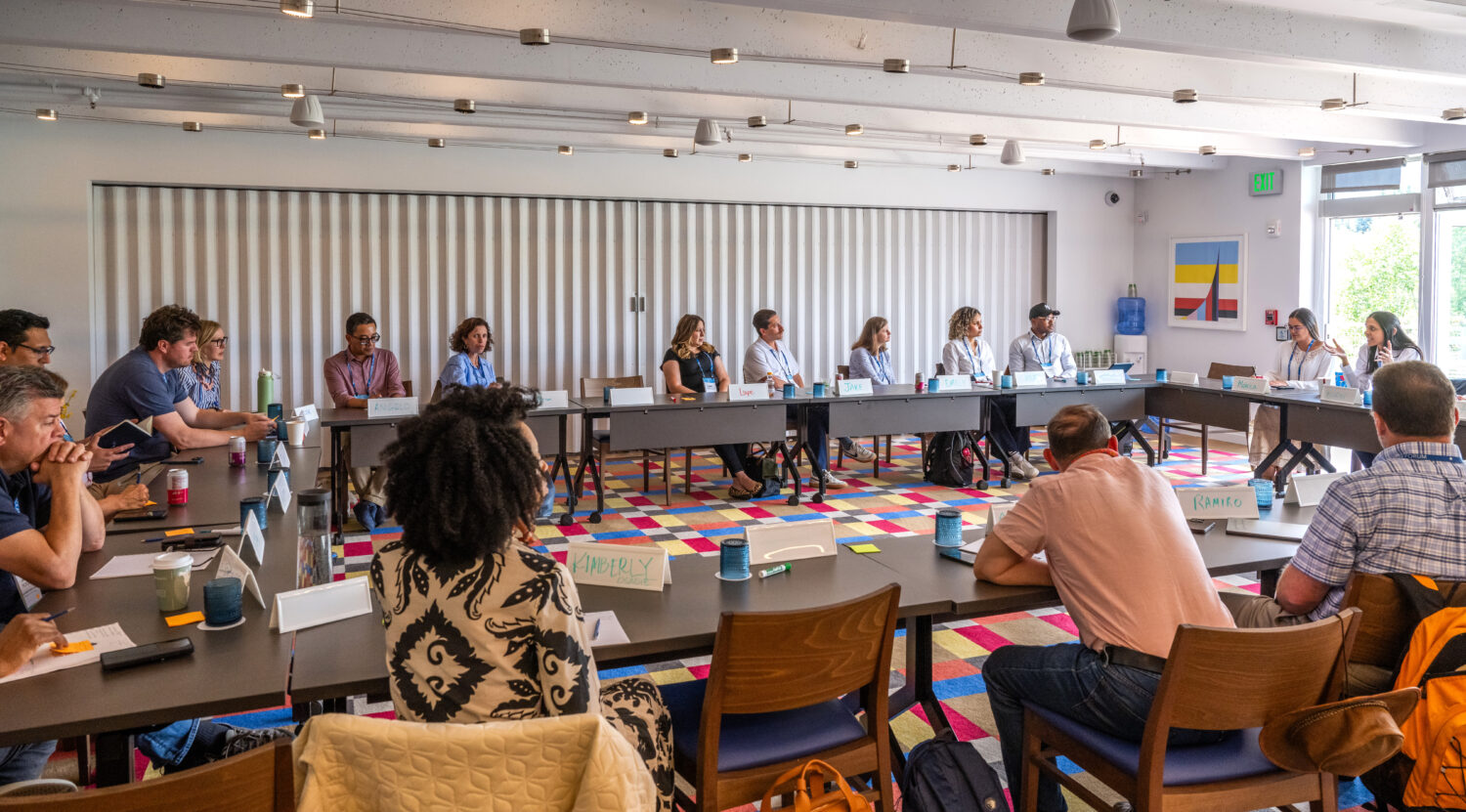Standing Firm on Shifting Ground: The New Rules of Principled Leadership
Conviction in Chaos: Leading with Moral Clarity
Briefer from the 2025 Resnick Aspen Action Forum
Every leader has that moment – when external pressures mount, when popular opinion turns, when doing the right thing might cost you everything. In boardrooms, capitals, and community centers across the globe, leaders are facing an impossible question: How do you do what’s right when the ground keeps shifting beneath your feet?
When public opinion changes overnight, when stakeholders all need different things, when the ‘right’ answer depends on which lens you’re looking through—how do you lead with conviction instead of just surviving the chaos? In our hyper-connected, rapidly changing world, these moments aren’t rare exceptions anymore. They’re the new normal.
At the Resnick Aspen Action Forum, the Aspen Global Leadership Network brought together leaders with very different backgrounds, from military veterans, to civil society and government officials, and global business leaders, who have all made critical decisions when the stakes were high and the path forward unclear.
In a roundtable on “Conviction in Chaos: Leading with Moral Clarity” they explored how leaders can build unshakeable conviction and maintain their moral compass when everything around them is spinning. This is the true work of a leader in today’s context.
The Surprising Truth About Conviction Under Pressure
Here’s what was uncovered from this roundtable: the leaders who thrive in chaos aren’t the ones with the strongest opinions – they’re the ones with the strongest practices. While some might assume moral clarity comes from having unwavering beliefs, the roundtable revealed something counterintuitive: conviction isn’t about certainty. It’s about developing the systems and capabilities to stay grounded when everything else is in flux.
Great leaders don’t just have a North Star — they know how to find it, even when it’s obscured or when they’re disoriented. When external pressures mount and popular opinion shifts, they have systems in place that enable them to act on their values even when no one is watching, and especially when everyone is. Read on for key takeaways from their discussion.

“Objective morality exists independent of whether we recognize it. What we need are systems — that help us navigate toward it when our vision is obscured and we’ve lost our bearings.”
– Elizabeth Neumann, National Security Expert and author of the book Kingdom of Rage: The Rise of Christian Extremism and the Path Back to Peace (Civil Society Fellow)
How exactly do leaders develop this capacity?
The dialogue identified seven practices:

1- Regular Self-Reflection and Constant Cultivation:
Leaders who maintain their moral center practice regular introspection and surround themselves with people who hold them accountable. This isn’t about seeking validation; it’s about creating systems that keep you aligned with your values when pressure mounts.
2- Embracing Diverse Perspectives:
Paradoxically, moral clarity strengthens when we engage with different viewpoints rather than retreating into echo chambers. The most effective leaders listen across differences and avoid “us versus them” thinking. Stories and dialogue bridge divides more effectively than arguments ever will.
“It is important and helpful to be surrounded by those in our own discipline. I have frequently gained support, fellowship, and advice from those within my field. However, I have also found it helpful, particularly as I have matured as a leader, to maintain a community of trustworthy peers outside of my discipline. I find that their insight often provides a drastically different, but equally important viewpoint. This difference in experience and insight allows me to really step back and view situations and my own decision-making from a variety of perspectives.”
– Melissa Hyatt, Senior Advisor, United States Marshals Service (Civil Society Fellow)
3- Faith and Purpose as Daily Anchors:
Whether through religious faith, philosophical principles, or deep sense of purpose, successful leaders ground themselves in something larger than immediate circumstances. This daily anchoring provides the resilience needed to face institutional chaos without losing direction.
4- Courage to Stand Alone:
The most challenging aspect of principled leadership is accepting that conviction sometimes requires isolation. The most effective leaders understand that compliance isn’t the same as doing what’s right, and sometimes, that can mean standing alone–times when your values matter the most.
Transformational leaders recognize that just because something is permissible doesn’t mean it serves the “good society.” This isn’t about breaking laws – it’s about the courage to lead with higher standards when regulations represent floors, not ceilings. Senior leaders often lack this willingness to risk comfort for conviction, but true change has always required bold action against entrenched systems.
“Courage is essential to the good life. Like any muscle, we strengthen it through practice — not by waiting for inspiration in moments of crisis, but by choosing the harder right over the easier wrong in everyday decisions. We build our capacity for bravery in low-stakes moments: speaking an uncomfortable truth in a meeting, admitting a mistake, questioning a convenient assumption. When life-altering challenges arrive, we don’t suddenly discover courage — we rely on the character we’ve already built.”
– Justin Habash, Senior Vice President of Leadership Programs and Chief Learning Officer, National Medal of Honor Center for Leadership
5- Accepting Our Humanity and Limitations:
Leading with conviction in chaos requires that we accept our limits. Leaders cannot operate as if we are tireless. Leading in chaos is draining physically, mentally, and emotionally. We need rhythms of rest; this is a discipline that sustains resilience.
And we cannot assume we are infallible. Leaders make mistakes. True moral courage includes the humility to ask for forgiveness, and often more difficult, to forgive yourself, when you fall short. Accepting our limits is also about having the wisdom to know when stepping back serves the greater good. Leadership isn’t always about wearing the crown.
6- Bearing the Cost of Conviction:
We must understand and be prepared for the reality that holding firm to our values and choosing ethical action can come at a significant personal cost—including job or career loss, reputational harm, and threats to our financial and professional well-being, and damage to or loss of relationships.
7- Building a Strong Community:
When times get tough, one often turns to their community to keep them grounded or to guide them toward their moral north. In uncertain times, remember that collective power amplifies individual conviction. Engage with your community, value differences of opinion, and recognize that imagination and young people bring vital perspectives to age-old challenges.

“Leaders need a community. Collective work is essential to drive impact in our societies. Community is the root of activism. Social change demands political agreements, caring for others, perseverance, bold strategies, integrity and innovative ideas. Beyond all of that it demands to be able to see the human side of every person and every struggle.”
– Catalina Martinez, Regional Director, Latin America and the Caribbean at the Center for Reproductive Rights (Aspen Colombia Fellow)
Moving Forward with Purpose: The path forward isn’t about eliminating uncertainty; it’s about developing the inner resources to lead with conviction regardless of external chaos. In a world that desperately needs principled leadership, moral clarity for leaders isn’t just personal — it’s a gift to everyone you serve.
These insights are drawn from the “Conviction in Chaos: Leading with Moral Clarity” a roundtable at the 2025 Resnick Aspen Action Forum, part of the Aspen Global Leadership Network’s commitment to fostering values-based leadership for humanity’s next chapter.
About the Aspen Global Leadership Network
The Aspen Global Leadership Network (AGLN) is a dynamic, worldwide community of nearly 4,000 entrepreneurial leaders from over 60 countries. Spanning business, government, and the nonprofit sector, these leaders share a commitment to enlightened leadership and the drive to tackle the most pressing challenges of our times. Through transformative Fellowship programs and gatherings like the Resnick Aspen Action Forum, AGLN Fellows have the unique opportunity to connect, collaborate, and challenge each other to grow and commit to a lifelong journey of impact.
More from 2025 Resnick Aspen Action Forum
In July 2025, over 500 leaders across the Aspen Global Leadership Network (AGLN) community gathered for our largest Action Forum to date. Joined by nearly 100 young leaders, AGLN Fellows from more than 30 countries returned to the enduring questions first posed at the founding of the Aspen Institute 75 years ago: What does it mean to lead with purpose in times of profound uncertainty?
Explore more inspiring content on leadership and change-making from the 2025 Action Forum here.
